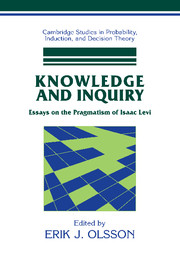Book contents
- Frontmatter
- Contents
- List of Contributors
- Preface
- Introduction: The Pragmatism of Isaac Levi
- 1 Isaac Levi and His Pragmatist Lineage
- 2 Is Pragmatist Truth Irrelevant to Inquiry?
- 3 The Knowledge Business
- 4 Infallibility and Incorrigibility
- 5 Why Inconsistency Is Not Hell: Making Room for Inconsistency in Science
- 6 Levi on Risk
- 7 Vexed Convexity
- 8 Levi's Chances
- 9 Isaac Levi's Potentially Surprising Epistemological Picture
- 10 Isaac Levi on Abduction
- 11 Potential Answers – To What Question?
- 12 Levi and the Lottery
- 13 The Value of Truth and the Value of Information: On Isaac Levi's Epistemology
- 14 Decision-Theoretic Contraction and Sequential Change
- 15 Deciding What You Know
- 16 Levi's Ideals
- 17 The Mind We do Not Change
- 18 Psychoanalysis as Technology
- 19 Levi on Money Pumps and Diachronic Dutch Books
- 20 Levi on the Reality of Dispositions
- 21 Replies
- Index
- References
5 - Why Inconsistency Is Not Hell: Making Room for Inconsistency in Science
Published online by Cambridge University Press: 05 March 2010
- Frontmatter
- Contents
- List of Contributors
- Preface
- Introduction: The Pragmatism of Isaac Levi
- 1 Isaac Levi and His Pragmatist Lineage
- 2 Is Pragmatist Truth Irrelevant to Inquiry?
- 3 The Knowledge Business
- 4 Infallibility and Incorrigibility
- 5 Why Inconsistency Is Not Hell: Making Room for Inconsistency in Science
- 6 Levi on Risk
- 7 Vexed Convexity
- 8 Levi's Chances
- 9 Isaac Levi's Potentially Surprising Epistemological Picture
- 10 Isaac Levi on Abduction
- 11 Potential Answers – To What Question?
- 12 Levi and the Lottery
- 13 The Value of Truth and the Value of Information: On Isaac Levi's Epistemology
- 14 Decision-Theoretic Contraction and Sequential Change
- 15 Deciding What You Know
- 16 Levi's Ideals
- 17 The Mind We do Not Change
- 18 Psychoanalysis as Technology
- 19 Levi on Money Pumps and Diachronic Dutch Books
- 20 Levi on the Reality of Dispositions
- 21 Replies
- Index
- References
Summary
INTRODUCTION
On most accounts of belief change, inconsistent belief systems are an “epistemic hell” to be avoided at all costs (see, e.g., Gärdenfors 1988, p. 51). From a normative point of view, we can perhaps understand why this is the case. The underlying logic of most theories of belief change is classical, and classical logic is explosive, that is, everything follows from a contradiction. And a belief system from which everything follows should definitely be avoided. It is certainly of not much use if one wants to determine what one should believe and what one should do.
In a number of works, Issac Levi challenged this way of approaching the issue. On his view, there are contexts in which inconsistent belief systems are bound to happen. This is the case, for example, of observations. According to Levi, in some contexts it is legitimate to add a doxastic proposition to a belief system with which it is inconsistent: “Making observations and coming to fully believe propositions incompatible with one's initial convictions is a case in point” (Levi 1991, p. 68). The idea is that we may inadvertently tumble into inconsistency as the result of “deploying a reliable program for routine expansion” (ibid., p. 110), that is, as the result of adding a new belief to our belief system. In other words, descriptively at least, inconsistent belief systems simply happen, and this fact needs to be accommodated.
- Type
- Chapter
- Information
- Knowledge and InquiryEssays on the Pragmatism of Isaac Levi, pp. 70 - 86Publisher: Cambridge University PressPrint publication year: 2006
References
- 5
- Cited by

